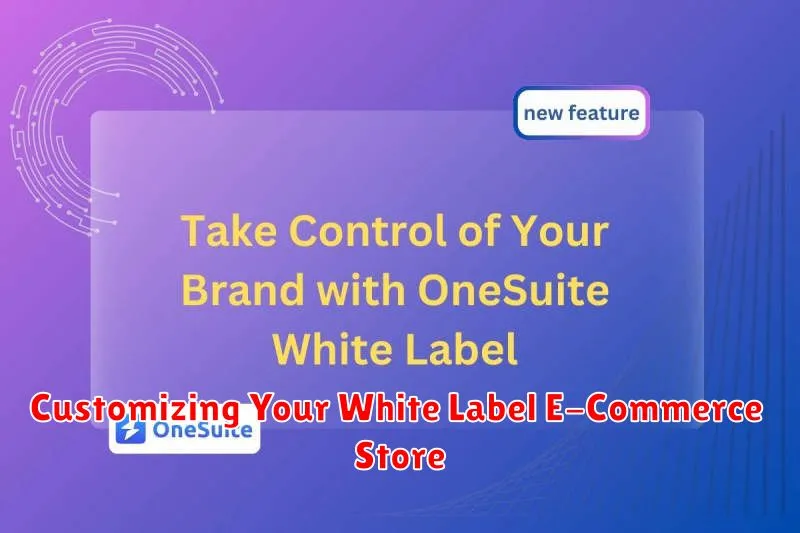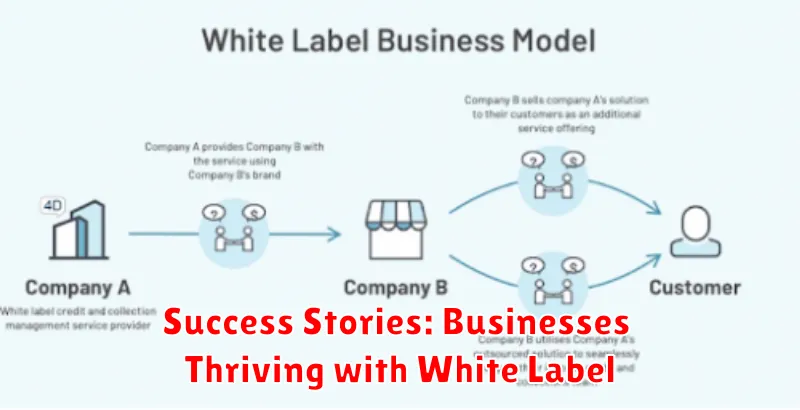Are you an aspiring entrepreneur looking to break into the competitive world of online retail, but overwhelmed by the complexities of building an e-commerce store from scratch? White label e-commerce may be the perfect solution. This comprehensive guide will introduce you to the concept of white label e-commerce, explaining what it is, how it works, and why it’s an attractive option for beginners. We’ll cover the key advantages and disadvantages of this business model, providing you with the foundation to determine if white labeling is the right approach for your e-commerce aspirations. Learn how to launch your online store quickly and efficiently, leveraging pre-built platforms and infrastructure to reach your target market without the hefty upfront investment and technical hurdles of traditional e-commerce development.
This guide will delve into the essential aspects of white label e-commerce, from selecting the right platform and customizing your store to marketing your products and managing your inventory. We’ll explore the benefits of white labeling, including faster time to market, reduced development costs, and access to established technologies. We’ll also address potential challenges such as limited customization options and platform dependency. By the end of this guide, you will have a clear understanding of the white label e-commerce landscape and be well-equipped to make informed decisions about launching and growing your online business. Discover how to leverage this powerful business model to build a successful and scalable online store with minimal technical expertise and upfront investment.
What is White Label E-Commerce?
White label e-commerce is a business model where you sell products online using a pre-built platform that you can customize and brand as your own. Think of it like buying a generic storefront and then decorating it to reflect your unique business. You don’t have to build the store from scratch; you simply personalize an existing one.
Essentially, you’re reselling a service, but with your own branding. The underlying technology, fulfillment, and sometimes even customer service are handled by the white label provider. Your focus is on marketing, sales, and building your brand.
This differs from dropshipping where you list products from various suppliers. With white label e-commerce, the platform and often the inventory come from a single provider, allowing for a more streamlined and controlled experience.
Benefits of Using a White Label E-Commerce Platform
Leveraging a white label e-commerce platform offers numerous advantages for businesses looking to establish an online presence quickly and efficiently. Reduced development time is a key benefit, as the platform is pre-built and ready to customize. This significantly lowers the time to market, allowing you to start selling faster.
Cost savings are another compelling reason. Instead of investing heavily in building an e-commerce solution from scratch, you can utilize an existing platform for a fraction of the cost. This frees up resources that can be allocated to other crucial areas like marketing and customer service.
Scalability is also a major plus. White label platforms are designed to handle growth, allowing you to easily expand your product offerings and customer base without significant technical hurdles. Furthermore, focus on branding becomes a priority. With the technical aspects handled, you can dedicate your efforts to creating a unique and memorable brand experience.
How to Choose the Right White Label E-Commerce Solution
Selecting the right white label e-commerce platform requires careful consideration of your business needs and goals. Scalability is crucial. Ensure the platform can handle your current needs and future growth, both in terms of product catalog size and transaction volume.
Pricing models vary significantly. Some platforms charge transaction fees, while others offer monthly or annual subscriptions. Carefully evaluate the pricing structure to determine the most cost-effective solution for your business.
Consider the level of customization offered. Some platforms provide extensive design flexibility, while others offer limited options. Choose a platform that allows you to create a unique brand experience.
Technical support is another essential factor. Look for a provider that offers responsive and reliable support to help you resolve any technical issues promptly. Evaluate the documentation and support resources available.
Finally, consider the platform’s integration capabilities. Ensure it can seamlessly integrate with your existing business systems, such as CRM, inventory management, and payment gateways.
Key Features to Look for in a White Label Platform
Choosing the right white label e-commerce platform hinges on identifying key features that align with your business needs. Prioritize platforms offering robust product management capabilities, enabling efficient inventory control, product listing, and categorization. Flexible customization options are crucial for branding and tailoring the platform to your specific aesthetic and target audience.
Seamless order fulfillment features streamline logistics, from automated order processing to shipping integrations. Look for secure payment gateway integrations that support various payment methods and ensure secure transactions. Reliable customer support is essential for troubleshooting technical issues and addressing user queries effectively.
Scalability should also be a primary consideration. The platform should be able to handle increasing traffic and transaction volumes as your business grows. Finally, comprehensive analytics and reporting tools are indispensable for tracking key performance indicators (KPIs) and making informed business decisions.
Integrating Your Brand with a White Label Solution
Integrating your brand into a white label e-commerce platform is crucial for creating a cohesive and recognizable customer experience. This process involves customizing various elements to reflect your unique brand identity.
Visual Branding: Start by incorporating your logo and brand colors throughout the platform. Customize the website template to align with your brand’s aesthetic. Consider using custom fonts and imagery that reinforce your brand message.
Domain and Email: Utilize a custom domain name that reflects your brand. Set up branded email addresses for customer communication, enhancing professionalism and trust.
Content and Messaging: Ensure all product descriptions, website copy, and customer service interactions align with your brand voice and values. This creates a consistent experience and builds brand loyalty.
Packaging and Shipping: Extend your branding to the physical aspects of the customer journey. Consider custom packaging and shipping labels to reinforce your brand identity even after purchase.
Customizing Your White Label E-Commerce Store

A key advantage of white label e-commerce is the ability to customize the platform to reflect your brand. This involves several key areas:
Branding: Implement your logo, color scheme, and typography throughout the store. This creates a consistent brand experience for your customers.
Product Selection: Curate a product catalog that aligns with your target audience and niche. Choose products that resonate with your brand identity and meet customer demands.
User Interface (UI): While the underlying platform remains the same, you can often customize the layout and user experience to some degree. This might involve selecting different themes or adjusting the navigation.
Domain and Email: Use a custom domain name and branded email addresses for a professional and trustworthy image. This strengthens brand recognition and reinforces your identity.
Launching and Marketing Your White Label Store
Once your white label e-commerce store is set up and customized, it’s time to launch and start marketing. A successful launch requires careful planning and execution.
Pre-launch Phase: Thoroughly test all aspects of your store, from product listings and payment gateways to shipping and customer service functionalities. Build anticipation by engaging your target audience on social media and through email marketing campaigns, offering sneak peeks and pre-launch discounts.
Launch Day: Officially announce your store’s opening across all marketing channels. Monitor website traffic and performance closely to identify and address any technical issues promptly.
Post-Launch Marketing: Implement a comprehensive marketing strategy that includes search engine optimization (SEO), paid advertising, social media marketing, and email marketing. Track key metrics like conversion rates and customer acquisition cost to optimize your campaigns.
Scaling Your Business with White Label E-Commerce
Once your white label e-commerce store is established and generating revenue, the next step is scaling your operations. Efficient scaling is crucial for long-term growth and profitability. This involves streamlining processes and strategically expanding your reach.
Automation plays a vital role in scaling. Automating tasks like order fulfillment, inventory management, and customer service communications frees up your time to focus on strategic decisions. Explore integrating your platform with tools that automate these processes.
Expanding your product offerings is another key scaling strategy. Analyze market trends and customer demand to identify new product opportunities. Consider adding complementary products or expanding into new niches relevant to your target audience.
Marketing and advertising are essential for reaching a wider audience. Invest in targeted advertising campaigns on social media and search engines. Explore influencer marketing and partnerships to broaden your brand’s visibility.
Finally, consider optimizing your supply chain. As your order volume increases, evaluate different suppliers and fulfillment options. Negotiate better rates and establish reliable logistics to handle increased demand efficiently.
Success Stories: Businesses Thriving with White Label

Examining real-world examples can provide valuable insights into the potential of white label e-commerce. Here are a few success stories demonstrating how businesses have leveraged this model to achieve their goals:
Fashion Forward Finds
A fashion blogger with a dedicated following used a white label platform to launch her own online boutique. By focusing on curated collections and personalized styling advice, she was able to quickly establish a loyal customer base and build a profitable business without the complexities of managing inventory and logistics.
Niche Market Mastery
An entrepreneur identified a growing demand for organic pet food. Using a white label solution, they quickly established an online presence offering a specialized product line. This targeted approach allowed them to capture a specific market segment and gain a competitive advantage.
Rapid Expansion Success
An established brick-and-mortar retailer used white labeling to rapidly expand their reach into the online marketplace. By leveraging an existing supplier network, they were able to offer a wider selection of products to customers across the country, significantly increasing sales and brand visibility.

